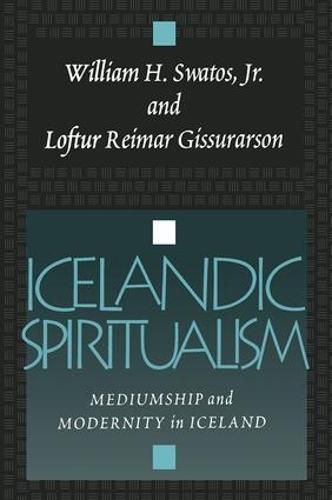Readings Newsletter
Become a Readings Member to make your shopping experience even easier.
Sign in or sign up for free!
You’re not far away from qualifying for FREE standard shipping within Australia
You’ve qualified for FREE standard shipping within Australia
The cart is loading…






Icelandic Spiritualism is an engaging social anthropological study of the place of spiritualism in Icelandic church and society during the first half of the twentieth century. Challenging standard theoretical approaches to the study of religion, the book contributes a wealth of data on the history of religion and psychical research, presenting it in a vivid descriptive narrative.
The authors trace the role of the spirit world in Icelandic culture, giving particular attention to the distinctive history of Iceland’s conversion to Christianity. They focus on the appearance of modern spiritualism as a distinct phenomenon in Icelandic life. The book studies the interaction between various groups in fin-de-siecle Icelandic society, not least in the state church, as mediumistic phenomena became widely reported through the newspapers.
To some, Icelandic spiritualism may be considered a deviant case of Protestantism. What makes this book interesting, however, is that the spiritualism is seen as integral to Iceland’s transition to modernity. While Icelandic Spiritualism concentrates mainly on the first half of the twentieth century, it also provides a summary of the continuation of spiritualist phenomena up to the current period. This intriguing study will be of interest to theologians, philosophers, sociologists, psychologists, and anthropologists.
$9.00 standard shipping within Australia
FREE standard shipping within Australia for orders over $100.00
Express & International shipping calculated at checkout
Icelandic Spiritualism is an engaging social anthropological study of the place of spiritualism in Icelandic church and society during the first half of the twentieth century. Challenging standard theoretical approaches to the study of religion, the book contributes a wealth of data on the history of religion and psychical research, presenting it in a vivid descriptive narrative.
The authors trace the role of the spirit world in Icelandic culture, giving particular attention to the distinctive history of Iceland’s conversion to Christianity. They focus on the appearance of modern spiritualism as a distinct phenomenon in Icelandic life. The book studies the interaction between various groups in fin-de-siecle Icelandic society, not least in the state church, as mediumistic phenomena became widely reported through the newspapers.
To some, Icelandic spiritualism may be considered a deviant case of Protestantism. What makes this book interesting, however, is that the spiritualism is seen as integral to Iceland’s transition to modernity. While Icelandic Spiritualism concentrates mainly on the first half of the twentieth century, it also provides a summary of the continuation of spiritualist phenomena up to the current period. This intriguing study will be of interest to theologians, philosophers, sociologists, psychologists, and anthropologists.